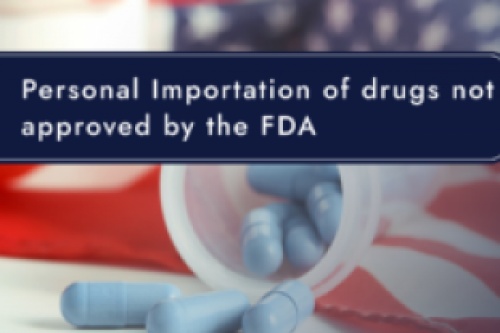Personal importation of prescription drugs not approved by the U.S. Food and Drug Administration (FDA) is an issue that has recently been brought to the forefront. This article will provide an overview of what personal importation is, and discuss the risks associated with this type of activity.
What is personal importation?
Personal importation is when a person brings in a drug or medical device that has not been approved by the FDA from a foreign country into the United States for their own use or for use on another person. It’s important to note that it must be done without any involvement of a commercial entity, like a pharmacy or drug wholesaler, for it to be considered personal importation.
Can I purchase or bring drug or device products from a foreign country to the U.S.?
The short answer is no. Patients do have access to certain medications from other countries but these medications must first meet FDA standards and be approved by the agency before they can be legally imported into the United States. If a patient attempts to purchase or bring an unapproved drug or device product from another country into the United States, even for personal use, they may face legal action. Additionally, because there are no guarantees about where these drugs come from and who manufactures them, there is no way of knowing if they are safe and effective.
If you need medication that cannot be obtained in the United States, you should talk with your doctor about getting access through clinical trials or expanded access programs overseen by the FDA. Your doctor can also contact drug companies directly if they believe importing medications may be necessary for your care.
Conclusion:
Importing prescription drugs into the United States can be a complex and confusing process due to the many regulations that govern drug importation. It is important to understand these regulations before attempting to import any prescription drugs into the country. Generally speaking, only drugs that have been approved by the FDA can be imported legally, with very few exceptions. Additionally, some prescription drugs are classified as controlled substances by the DEA and require an import license in order to be brought into the country legally. Finally, personal importations may be refused by the FDA for several reasons, including if the drug is unapproved or counterfeit, if it is a controlled substance, or if it does not meet all other requirements for legal importation.












 4 Reasons Digital Marketing is Best for SMEs
4 Reasons Digital Marketing is Best for SMEs



